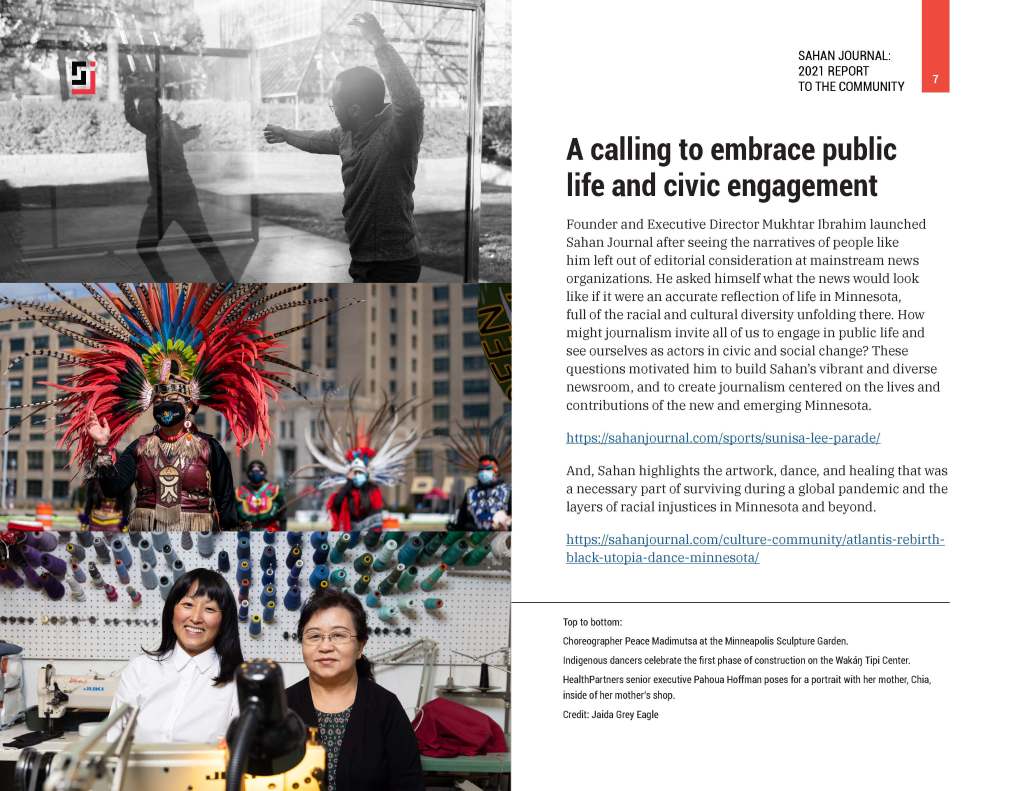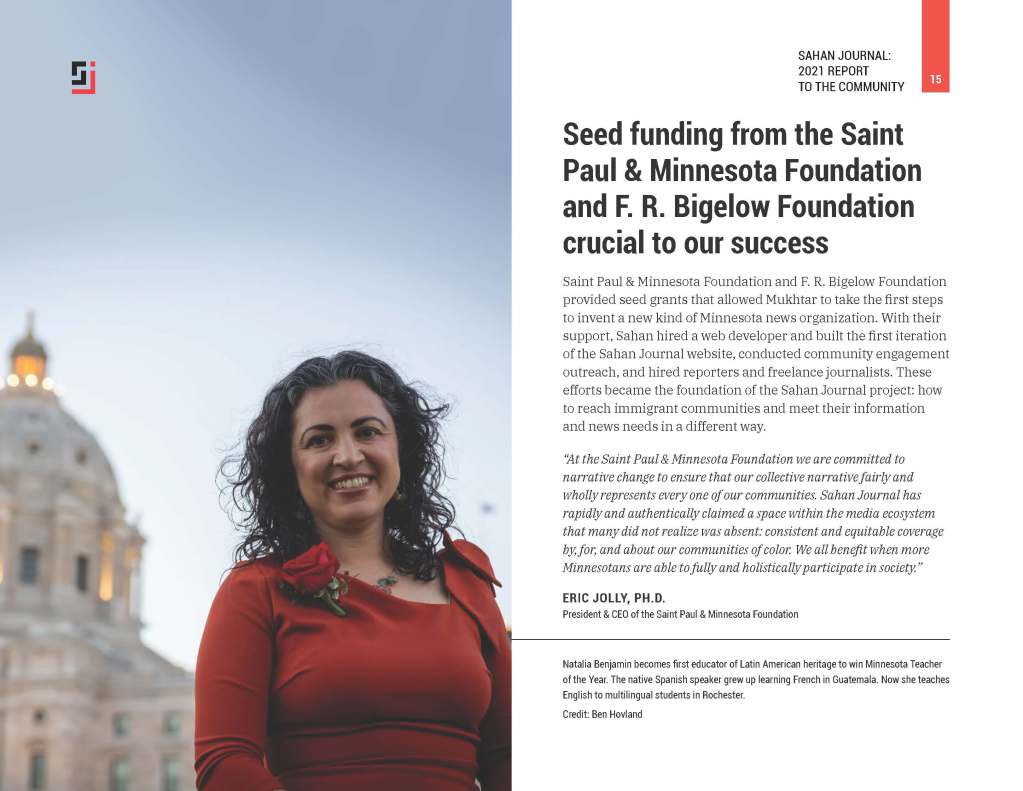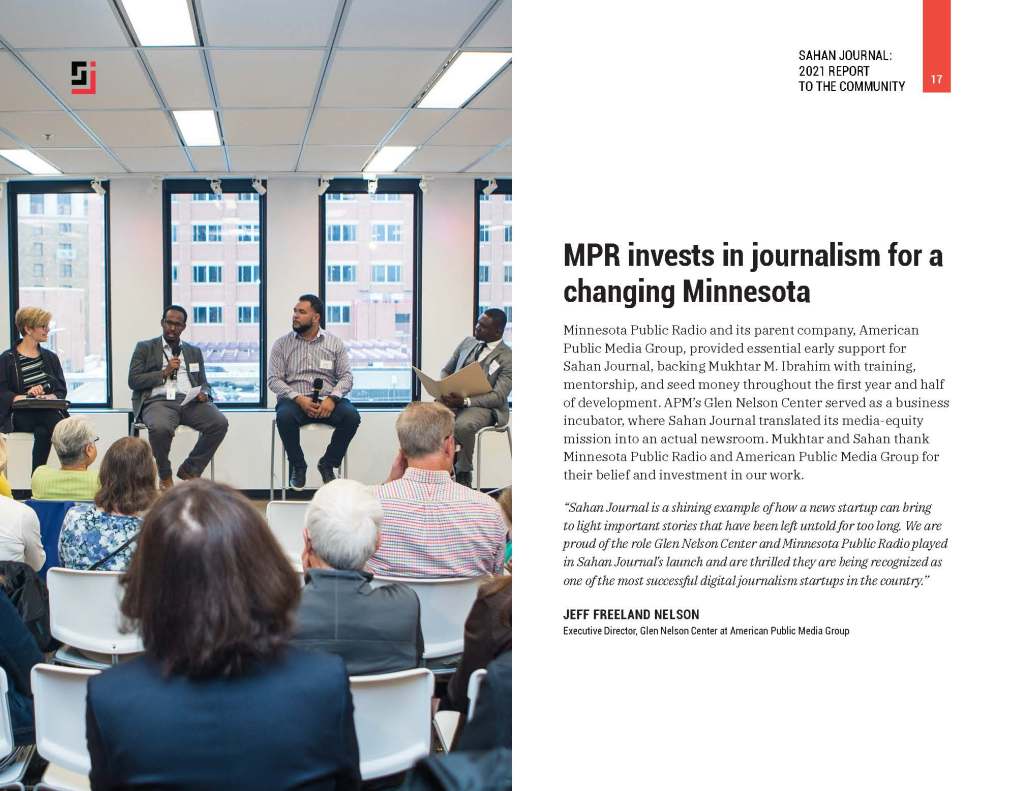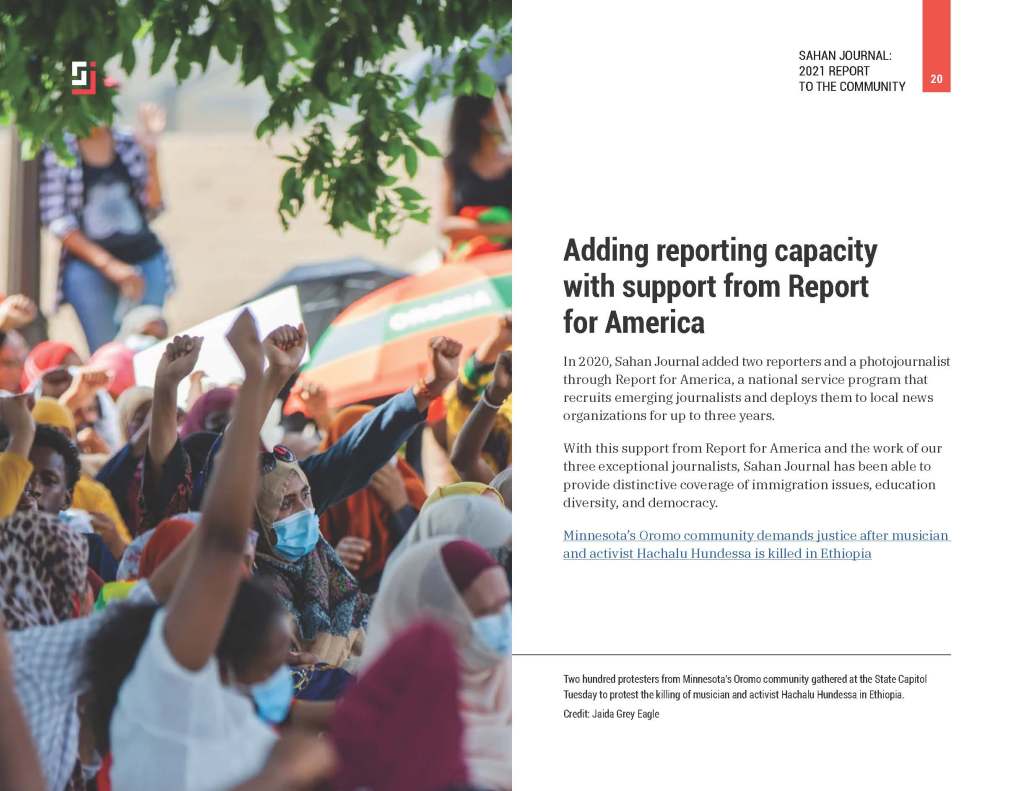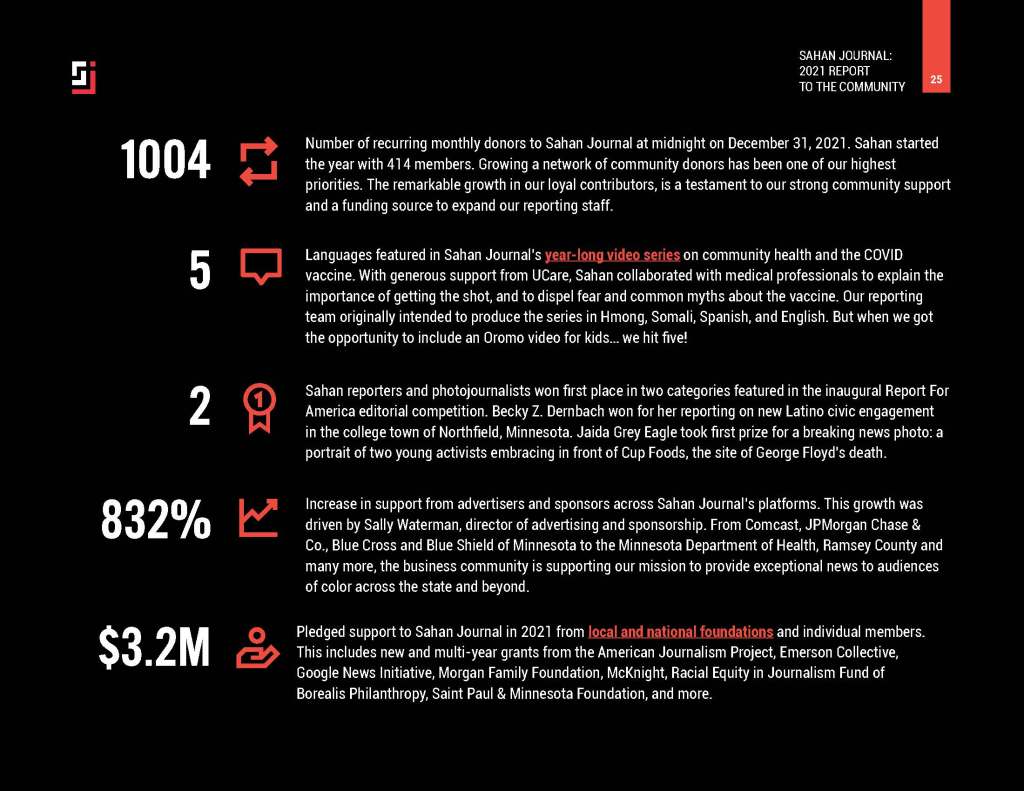Founded in August of 2019, Sahan Journal is a nonprofit digital newsroom dedicated to reporting for immigrants and communities of color in Minnesota. Our diverse staff creates exceptional journalism: coverage that truly represents the changing face of Minnesota and recognizes that democratic engagement and power belong to everyone.
Our stories reach audiences across many platforms, including our website, social media, video, newsletters, and community events. To reach more audiences, we share our stories with small community papers and with the state’s biggest mainstream newsrooms, in print and public radio.
Sahan Journal’s mission is to give immigrants and communities of color the kind of committed, responsive news coverage that we all deserve.
Our mission
To provide fair, groundbreaking news coverage that illuminates issues affecting Minnesota immigrants and communities of color and to chronicle how these communities are changing and redefining what it means to be a Minnesotan.
Our vision
To become an indispensable and trusted source of news and information for immigrants and communities of color in Minnesota.
Our team
Board of Directors
- President: Laura Yuen, Star Tribune features columnist
- Dr. Nusheen Ameenuddin, Mayo Clinic pediatrician
- Nancy Cassutt, EVP Content, I.E. Network
- Fred de Sam Lazaro, Under-Told Stories Project director and correspondent
Connect with us
Contact us with questions, feedback, or story ideas.
Follow us on Instagram, TikTok, X, LinkedIn, Facebook, and YouTube.
Subscribe to our free newsletters.
How we are funded
Tax returns and financial statements
Our tax identification number is 83-2745995. Your contribution is tax-deductible to the fullest extent of the law.
Sahan Journal editorial policy
We subscribe to standards of editorial independence adopted by the Institute for Nonprofit News:
Our organization retains full authority over editorial content to protect the best journalistic and business interests of our organization. We maintain a firewall between news coverage decisions and sources of all revenue. Acceptance of financial support does not constitute implied or actual endorsement of donors or their products, services or opinions.
We accept gifts, grants and sponsorships from individuals and organizations for the general support of our activities, but our news judgments are made independently and not on the basis of donor support.
Our organization may consider donations to support the coverage of particular topics, but our organization maintains editorial control of the coverage. We will cede no right of review or influence of editorial content, nor of unauthorized distribution of editorial content.
Our organization will make public all donors who give a total of $5,000 or more per year. We will accept anonymous donations for general support only if it is clear that sufficient safeguards have been put into place that the expenditure of that donation is made independently by our organization and in compliance with Sahan Journal’s Membership Standards.
Society of Professional Journalists code of ethics
Preamble
Members of the Society of Professional Journalists believe that public enlightenment is the forerunner of justice and the foundation of democracy. Ethical journalism strives to ensure the free exchange of information that is accurate, fair and thorough. An ethical journalist acts with integrity.
The Society declares these four principles as the foundation of ethical journalism and encourages their use in its practice by all people in all media.
Seek truth and report it
Ethical journalism should be accurate and fair. Journalists should be honest and courageous in gathering, reporting and interpreting information.
Journalists should:
- Take responsibility for the accuracy of their work. Verify information before releasing it. Use original sources whenever possible.
- Remember that neither speed nor format excuses inaccuracy.
- Provide context. Take special care not to misrepresent or oversimplify in promoting, previewing or summarizing a story.
- Gather, update and correct information throughout the life of a news story.
- Be cautious when making promises, but keep the promises they make.
- Identify sources clearly. The public is entitled to as much information as possible to judge the reliability and motivations of sources.
- Consider sources’ motives before promising anonymity. Reserve anonymity for sources who may face danger, retribution or other harm, and have information that cannot be obtained elsewhere. Explain why anonymity was granted.
- Diligently seek subjects of news coverage to allow them to respond to criticism or allegations of wrongdoing.
- Avoid undercover or other surreptitious methods of gathering information unless traditional, open methods will not yield information vital to the public.
- Be vigilant and courageous about holding those with power accountable. Give voice to the voiceless.
- Support the open and civil exchange of views, even views they find repugnant.
- Recognize a special obligation to serve as watchdogs over public affairs and government. Seek to ensure that the public’s business is conducted in the open, and that public records are open to all.
- Provide access to source material when it is relevant and appropriate.
- Boldly tell the story of the diversity and magnitude of the human experience. Seek sources whose voices we seldom hear.
- Avoid stereotyping. Journalists should examine the ways their values and experiences may shape their reporting.
- Label advocacy and commentary.
- Never deliberately distort facts or context, including visual information. Clearly label illustrations and re-enactments.
- Never plagiarize. Always attribute.
Minimize harm
Ethical journalism treats sources, subjects, colleagues and members of the public as human beings deserving of respect.
Journalists should:
- Balance the public’s need for information against potential harm or discomfort. Pursuit of the news is not a license for arrogance or undue intrusiveness.
- Show compassion for those who may be affected by news coverage. Use heightened sensitivity when dealing with juveniles, victims of sex crimes, and sources or subjects who are inexperienced or unable to give consent. Consider cultural differences in approach and treatment.
- Recognize that legal access to information differs from an ethical justification to publish or broadcast.
- Realize that private people have a greater right to control information about themselves than public figures and others who seek power, influence or attention. Weigh the consequences of publishing or broadcasting personal information.
- Avoid pandering to lurid curiosity, even if others do.
- Balance a suspect’s right to a fair trial with the public’s right to know. Consider the implications of identifying criminal suspects before they face legal charges.
- Consider the long-term implications of the extended reach and permanence of publication. Provide updated and more complete information as appropriate.
Act independently
The highest and primary obligation of ethical journalism is to serve the public.
Journalists should:
- Avoid conflicts of interest, real or perceived. Disclose unavoidable conflicts.
- Refuse gifts, favors, fees, free travel and special treatment, and avoid political and other outside activities that may compromise integrity or impartiality, or may damage credibility.
- Be wary of sources offering information for favors or money; do not pay for access to news. Identify content provided by outside sources, whether paid or not.
- Deny favored treatment to advertisers, donors or any other special interests, and resist internal and external pressure to influence coverage.
- Distinguish news from advertising and shun hybrids that blur the lines between the two. Prominently label sponsored content.
Be accountable and transparent
Ethical journalism means taking responsibility for one’s work and explaining one’s decisions to the public.
Journalists should:
- Explain ethical choices and processes to audiences. Encourage a civil dialogue with the public about journalistic practices, coverage and news content.
- Respond quickly to questions about accuracy, clarity and fairness.
- Acknowledge mistakes and correct them promptly and prominently. Explain corrections and clarifications carefully and clearly.
- Expose unethical conduct in journalism, including within their organizations.
- Abide by the same high standards they expect of others.
More information about SPJ and its Code of Ethics is available at www.spj.org.
Sahan Journal conflict of interest policy
The following Financial Conflict of Interest Policy (“Conflict of Interest Policy”) is an effort (i) to ensure that the deliberations and decisions of Sahan Journal (“Sahan Journal”) are made solely in the interest of promoting the quality of journalism in the state of Minnesota, and (ii) to protect the interests of Sahan Journal when it considers any transaction, contract, or arrangement that might benefit or be perceived to benefit the private interest of a person affiliated with Sahan Journal (each, a “Sahan Journal Representative”). As used in this Conflict of Interest Policy, a Sahan Journal Representative includes any director, advisory board Sahan Journal, financial advisor, legal counsel or employee.
- Duty to Sahan Journal. Each Sahan Journal Representative owes a duty to Sahan Journal to advance Sahan Journal’s legitimate interests when the opportunity to do so arises. Each Sahan Journal Representative must give undivided allegiance when making decisions affecting the organization. Similarly, Sahan Journal Representatives must be faithful to Sahan Journal’s nonprofit mission and are not permitted to act in a way that is inconsistent with the central goals of the organization and its nonprofit status.
- Gifts. No Sahan Journal Representative shall personally accept gifts or favors that could compromise his or her loyalty to Sahan Journal. Any gifts or benefits personally accepted from a party having a material interest in the outcome of Sahan Journal or its employees by a Sahan Journal Representative individually should be merely incidental to his or her role as a Sahan Journal Representative and should not be of substantial value. Any gift with a value of $250 or more, or any gifts with a cumulative value in excess of $250 received by a Sahan Journal Representative in any twelve-month period from a single source, shall be considered substantial. Cash payments may not be accepted, and no gifts should be accepted if there are strings attached. For example, no Sahan Journal Representative may accept gifts if he or she knows that such gifts are being given to solicit his or her support of or opposition to the outcome or content of any Sahan Journal publication.
- Conflicts of interest. The following are examples of conflicts of interest which must be promptly disclosed to the Sahan Journal Board of Directors pursuant to Section 4 below by any Sahan Journal Representative with knowledge of such conflict of interest:
- (a) any real or apparent conflict of interest between a donor or the subject of an Sahan Journal publication or report and an Sahan Journal Representative;
- (b) an Sahan Journal Representative’s ownership of an equity interest in a person or entity that is or will be the subject of an Sahan Journal publication or report; and
- (c) failure to disclose to Sahan Journal all relationships between the subject of any Sahan Journal publication or report and any Sahan Journal Representative or close relatives of the Sahan Journal Representative.
- Conflict procedure:
- (a) If an Sahan Journal Representative or party related to an Sahan Journal Representative has an interest in any contract, action or transaction to be entered into with Sahan Journal, a conflict of interest or potential conflict of interest exists. Any Sahan Journal Representative having knowledge that such a conflict of interest exists or may exist (an “Interested Sahan Journal Representative”) will so advise the Board of Directors promptly. An Interested Sahan Journal Representative will include in the notice the material facts as to the relationship or interest of the Interested Sahan Journal Representative in the entity proposing to enter into a contract, action or transaction with Sahan Journal.
- (b) Notwithstanding anything herein to the contrary, the Board of Directors may authorize any committee appointed pursuant to the Sahan Journal by-laws (a “Committee”) to act in lieu of the Board of Directors in determining whether an action, contract or transaction is fair to Sahan Journal as of the time it is authorized or approved by the Committee.
- (c) At any time that a conflict of interest or potential conflict of interest is identified, the President of the Board or a Chair of the applicable Committee will ensure that such conflict of interest is placed on the agenda for the next meeting of the Board of Directors or the Committee, as applicable. The notice of such meeting of the Board of Directors or the Committee, as applicable, will include, to the extent available when the notice is sent, a description of the conflict of interest matter to be discussed. By notice before the meeting or at the meeting, the directors on the board or the Committee, as applicable, will be advised that a vote will be taken at the meeting and that, in order to authorize the relevant contract, action or transaction, an affirmative vote of a majority of disinterested directors present at the meeting at which a quorum is present will be required and will be sufficient, even though the disinterested directors constitute less than a quorum of the Board of Directors or the Committee.
- (d) Reasonable effort will be made to cause the material facts concerning the relationships between the individuals and Sahan Journal which create the conflict to be delivered to and shared with the Sahan Journals of the Board of Directors or the Committee, as applicable, prior to the meeting to enable the directors to arrive at the meeting prepared to discuss the issue. In the event it is not practicable to deliver the information prior to the meeting, it will be delivered to the directors at the meeting, and the directors can act upon the matter with the same authority as if notice had been given prior to the meeting.
- (e) The Board of Directors or the Committee, as applicable, will invite all parties to the conflict of interest to attend the meeting, to make presentations and to be prepared to answer questions, if necessary. The Board or Directors or the Committee, as applicable, will also invite outside experts if necessary.
- (f) At the meeting, providing a quorum is present, the conflict will be discussed to ensure that the directors present are aware of the issues and the factors involved. The interested directors may be counted for purposes of a quorum, even though they may not take part in any vote on the issues.
- (g) The Board of Directors or the Committee, as applicable, must decide, in good faith, reasonably justified by the material facts, whether the action, contract or transaction would be in the best interest of Sahan Journal and fair to Sahan Journal as of the time it is authorized or approved.
- (h) All interested directors must abstain from voting and, if necessary, leave the room when the vote is taken.
- (i) The Board of Directors or the Committee, as applicable, will maintain a written account of all that transpires at the meeting and incorporate such account into the minutes of the meeting and disseminate it to the full Board of Directors. Such minutes will be presented for approval at the next meeting of the Board of Directors and maintained in the corporate record book.
- (j) To the extent that the conflict of interest is continuing and the contract, action or transaction goes beyond one (1) year, the foregoing notice and discussion and vote will be repeated on an annual basis.
- Personal loans. Sahan Journal may not loan to, or guarantee the personal obligations of, any Sahan Journal Representative.










